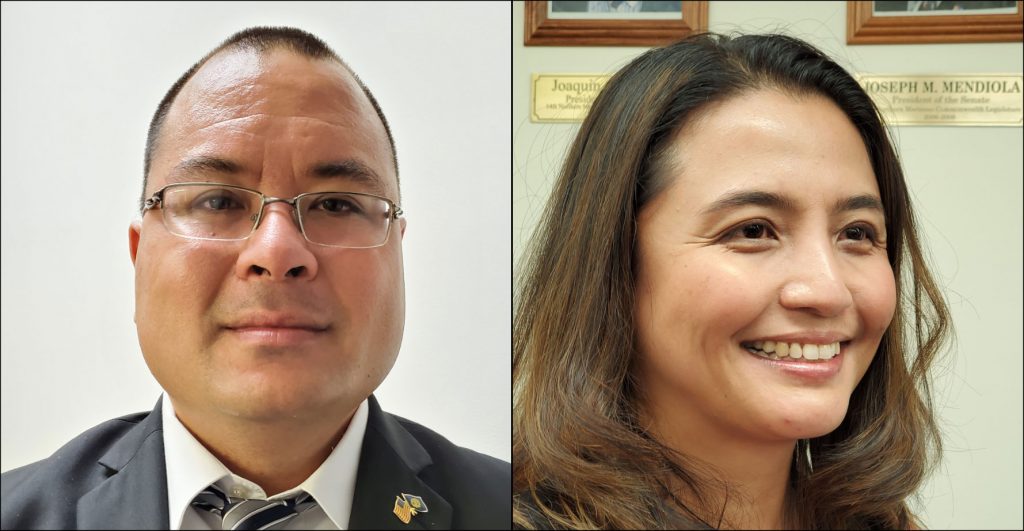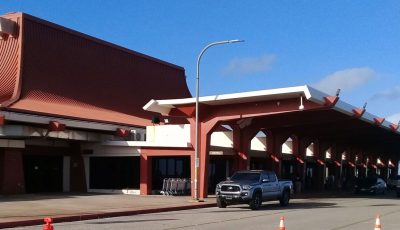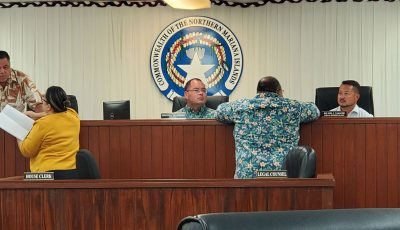DESPITE STRONG OPA OPPOSITION
House passes bill to exempt CPA airport revenues from 1% OPA fee
Sablan, Staffler, Propst vote ‘no’
Despite the strong opposition of the Office of the Public Auditor, the House of Representatives passed yesterday with amendments a bill that would exempt the Commonwealth Ports Authority from paying the 1% OPA fee with respect to CPA’s airport revenues.
With 15 representatives voting “yes” and three voting “no,” House Bill 22-102, HS1 now goes to the Senate for similar passage. House Speaker Edmund S. Villagomez (Ind-Saipan) is the main author of the bill.
The three who voted “no” were Reps. Christina E. Sablan, Leila F. Staffler, and Edwin K. Propst. All are Democrats representing Saipan. Two representatives were absent. Minority leader Angel A. Demapan (R-Saipan) voted “yes” but “with deep reservations.”
During the public portion at the start of the session, Public Auditor Kina B. Peter asked House members not be pressured into voting for a legislation that is very impactful to a CNMI regulatory agency.
“Again, I ask that this legislative body allow OPA as a regulatory agency of the CNMI to function and exist without the continued threat of its funding and independence,” Peter said.
The public auditor said that enacting this legislation without a definitive answer from the Federal Aviation Administration whether CPA’s payment of the 1% OPA fee is revenue diversion does not represent good governance.
Peter said CPA has undertaken this effort to change this law when they are currently faced with at least 18 FAA non-compliance and unresolved audit findings, all of which could potentially place CPA’s funding at risk.
None of those, she said, represent findings that have to do with CPA’s current obligations to pay OPA’s 1% fee.
Peter said FAA officials have appeared before the House on behalf of CPA to change CNMI laws, when the FAA has never made any affirmative finding that payment by CPA would constitute a revenue diversion.
“While they were willing to explain what sort of fee arrangement would be allowed for FAA reimbursement, they could not provide a final determination whether OPA’s fixed fee is indeed a violation of FAA statute,” the public auditor said.
She said the five-year sunset provision in the bill is excessive as it should not take that period to obtain a final decision from FAA.
Peter said five years is not equitable to other autonomous agencies and public corporations that have to absorb their share of OPA’s 1% fee.
Before the House passed the bill, 15 representatives voted “yes” and three voted “no” to Villagomez’s floor amendment to the bill. Sablan, Staffler, and Propst voted against the floor amendment.
Villagomez moved to delete the lines that state that “this exemption is subject to a sunset provision of five years from the effective date of this act or for the agency’s time to obtain a clear determination from federal grantors as to whether the payment of the 1% public auditor fee from airport revenues is revenue diversion or not.”
The speaker also moved to delete the word “temporarily” and the sunset clause in its entirety.
Before voting to pass the bill, Villagomez said he attended two meetings with CPA, OPA, FAA, and two House members, and the main issue is the revenue diversion. Villagomez said it was mentioned that that OPA fee is not really a non-compliance, but that his understanding is it’s because that fee has never been remitted.
“So how do you say something is revenue diversion when you haven’t diverted it,” he pointed out.
Villagomez said the airport is important to the CNMI’s economy, not only for commercial reasons, but also for residents and people that travel for all kinds of reasons.
Sablan thanked Demapan and Staffler for raising the question whether they could wait for some further clarification about the revenue diversion issue.
“I certainly have no issues with that. That would be my preference, quite honestly,” Sablan said.
She said OPA really wants time to get that answer from FAA, and that she knows that process has begun. Sablan said she believes there are meetings that are supposed to happen in the next couple of weeks.
“I have no objection to leaving this on the calendar. Maybe we could get an answer sooner rather than later,” said Sablan, adding that she hopes they be able to get an answer sooner than the three years or five years that were originally proposed.
She said they all share an interest in supporting both OPA as well as CPA and not undermining one in favor of the other.
Sablan said OPA expressed an interest in getting clarification because if there is a revenue diversion they will not object to an exemption for the OPA for airport revenue. She said it was just the absence of that clear answer that was troubling.
“So I would support keeping this on calendar and really getting a better idea of, you know, how soon we could get that final determination from FAA,” Sablan said.
She added that it might be worthwhile as well to enlist the support of Delegate Gregorio Kilili C. Sablan in coordinating communications with FAA headquarters.
Staffler said both CPA and OPA are important for the economy, for access to the ports, both air and sea, for people. “And so is it possible to keep this on calendar a little bit longer in order to wait for that information is my question,” she said.
Demapan said the intent of this legislation put them in a difficult position, like being caught “between a rock and hard place.”
Demapan said he wants to believe that they all support the functions of OPA as well as the functions of CPA. “I hear that there is discussion ongoing to determine whether it is revenue diversion or not. And if that is the case, was there any discussion in the House on whether or not we should wait for that determination?” he said.
He said he is inclined to support the bill for the sake of the economy by way of keeping the airports and seaports open, but he also does not want to backfire also, “that when this determination comes out unfavorable, we have to rush back to the table to fix it legislatively.”
Last Wednesday, Sablan offered to the House Ways and Means Committee that reviewed the legislation some amendments to the bill.
Instead of exempting the entire CPA from paying the OPA fee, Sablan proposed a temporary exemption for CPA’s airport revenue only, since CPA doesn’t dispute being charged the fee for non-airport revenue.
Ways and Means chair Rep. Donald M. Manglona (Ind-Rota) also moved during Wednesday’s meeting to create a sunset clause and extend it from three years to five years, in what he described as “a spirit of compromise.” The committee approved the substitute bill.




























